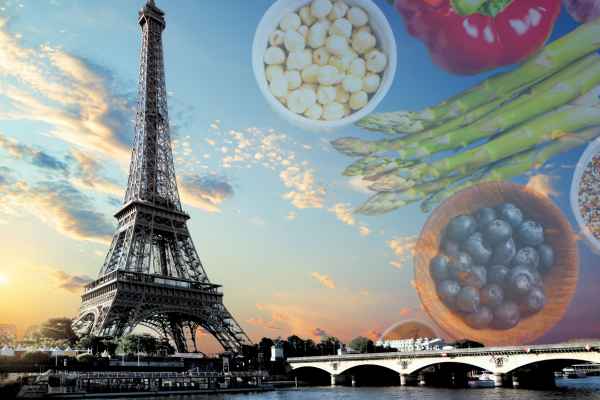An olympian effort to cut carbon
Meat-free menus are the talk of Paris as the sustainable food sector forges ahead.

Vegetarian meals will make up 60 per cent of the recipes available to spectators at the Paris 2024 Olympics as it seeks to halve its carbon footprint.
Adding poignancy to this challenge was this week's news that the world had clocked up its hottest day ever recorded – only days before the Olympic torch began its journey through Paris.
Some of the measures to reduce the carbon footprint of the games will see athletes sleep on recyclable cardboard beds by night and choose from a wider selection of plant-based meal options by day.
Although the elimination of single-use food packaging and utensils have also been heavily promoted, some French media outlets have highlighted that ongoing sponsorships with companies such as Coca-Cola appear to contradict this commitment.
"We are convinced that with these Games we have a unique opportunity to do things differently and show that another model is possible"
Games organisers have, however, stepped things up substantially for spectators’ dining options. Manager of food & beverages Philipp Würz said: “It is with immense pride that we can announce that all the food options at La Concorde will be 100 per cent vegetarian. It is a first in the history of the Games and the result of four years of work.”
Meat-free hot dogs with crispy onions, pickled red cabbage and a honey mustard sauce is just one of the offerings for spectators dining at the La Concorde arena during Olympic basketball, skateboarding and BMX events.
“We are convinced that with these Games we have a unique opportunity to do things differently and show that another model is possible,” Würz said.
Crafting food from carbon
While the Olympics' meatless menus are aimed at reducing carbon emissions, other food innovators are developing new categories of food actually made from C02.
California-based Savor is creating fats made from a combination of C02 and hydrogen that has food-lovers excited because of its strong similarity to animal fats such as butter.
By studying the chains of carbon and hydrogen atoms in animal-derived fats, the company says it learned how to recreate these using a combination of C02, heat and hydrogen to form chains that are then blended with oxygen from air.
They say the resulting fat molecules are identical to their animal equivalents but without emitting greenhouse gas, using no hormones or fertiliser, and using substantially less water
One of Savor’s backers is billionaire, Bill Gates. “I’ve tasted Savor’s products, and I couldn’t believe I wasn’t eating real butter,” Gates said. “The big challenge is to drive down the price so that products like Savor’s become affordable to the masses - either the same cost as animal fats or less.”
New Zealand’s Jooules is another startup using C02, in this case to create a complete protein.
Jooules says that it has demonstrated a method to produce functional food-grade protein from C02 emissions in the lab by harnessing microbes in a process centred on gaseous fermentation.
"Our protein is designed specifically for food manufacturers around the world seeking a more sustainable protein source and will be ideal for both human and high-value companion animal diets."
In May Jooules raised NZ$1million through the Sprout Accelerator to fund development of a process that the company says has potential to consume about 600 times less water and 99% less land compared to traditional protein production.
According to Jooules’ founder David McLellan, early testing has established that the proteins produced by gaseous fermentation met the UN Food Agriculture Organisation standards for the nutritional density of complete proteins, including having all nine essential amino acids.
“Our protein is designed specifically for food manufacturers around the world seeking a more sustainable protein source and will be ideal for both human and high-value companion animal diets,” McLellan said.





